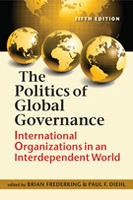The Politics of Global Governance: International Organizations in an Interdependent World, 5th edition
Brian Frederking and Paul F. Diehl, editors | | ISBN: 978-1-62637-232-0 $32.00 |
| 2015/431 pages/LC: 2015000924 Sorry, ebook unavailable. |
DESCRIPTION
Covering decisionmaking processes, peace and security affairs, and economic, social, and humanitarian issues, The Politics of Global Governance helps students of international organizations to understand the major themes, theories, and approaches central to the subject. The fifteen new selections in this fully revised edition reflect an increased emphasis on transnational governance and emerging global norms. The editors' section introductions underscore the importance of the essays, which have been selected not only for their relevance, but also their accessibility.
ABOUT THE AUTHOR
Brian Frederking is professor of political science at McKendree University. Paul F. Diehl is Ashbel Smith Professor and associate provost at the University of Texas–Dallas. His recent publications include Evaluating Peace Operations (with Daniel Druckman) and The Scourge of War: New Extensions of an Old Problem.
CONTENTS
- Introduction—the Editors.
- OVERVIEW.
- Identifying Formal International Organizations—T.J. Volgy et al.
- Why States Act Through Formal International Organizations—K.W. Abbott and D. Snidal.
- DECISIONMAKING.
- Introduction to Part 2—the Editors.
- Myths of Membership: The Politics of Legitimation in UN Security Council Reform—I. Hurd.
- Transnational Advocacy Networks in International and Regional Politics—M.E. Keck and K. Sikkink.
- PEACE AND SECURITY AFFAIRS.
- Introduction to Part 3—the Editors.
- Demanding Peace: The Impact of Prevailing Conflict on the Shift from Peacekeeping to Peacebuilding—A. Balas et al.
- "The Responsibility to Protect": Humanitarian Concern and the Lawfulness of Armed Intervention—C.C. Joyner.
- Targeting the Right Targets? The UN Use of Individual Sanctions—P. Wallensteen and H. Grusell.
- A Tale of Two Institutions: The UN Security Council and the International Criminal Court—R. Aloisi.
- ECONOMIC ISSUES.
- Introduction to Part 4—the Editors.
- International Norm Dynamics and the "End of Poverty": Understanding the Millennium Development Goals—S. Fukuda-Parr and D. Hulme.
- The Regime Complex for Food Security: Implications for the Global Hunger Challenge—M.E. Margulis.
- Providing a Release Valve: The US-China Experience with the WTO Dispute Settlement System—K.J. Castel-Fodor.
- Global Governance and the Spread of Cyberspace Controls—R.J. Deibert and M. Crete-Nishihata.
- The Financial Crisis, Contested Legitimacy, and the Genesis of Intra-BRICS Cooperation—O. Stuenkel.
- Is the EU Collapsing?—W.J. Thies.
- SOCIAL AND HUMANITARIAN ISSUES.
- Introduction to Part 5—the Editors.
- The Promise and Challenge of Global Network Governance: The Global Outbreak Alert and Response Network—C. Ansell et al.
- Order Out of Chaos: Public and Private Rules for Managing Carbon—J.F. Green.
- Global Human Rights Monitoring, New Technologies, and the Politics of Information—P. Alston and C. Gillespie.
- Trafficking of Women: Norms, Realities, and Challenges—R. Manjoo.
- INTERNATIONAL ORGANIZATIONS AND THE FUTURE.
- Reforming the United Nations: Lessons from a History of Progress—E.C. Luck.


Praise for the previous editions:
"Excellent.... [This] may be the best contemporary reader for advanced undergraduate classes in international governmental organizations.... The level of analysis and readability of [the] choices is ideal."—Philip Meeks, Perspectives on Political Science